35 episodes


In this episode, get ready to dig into the quirky world of dung beetles and discover how these little champions are like the superheroes of soil health on farms! Join us and our guests as we chat about the fantastic benefits dung beetles bring to Australian farmers – from reducing water runoff to boosting pasture growth and improving soil in grazing systems, to keeping pests in check, and even mastering the art of carbon sequestration. These remarkable critters prove that sometimes, in the smallest packages, you find the mightiest heroes for our planet's well-being. Thank you to our guests featured in this episode: __ Russ Barrow Ed Hogan Keri Chittenden Michael McDonald __ For more information: __ Dung Beetle Ecosystem Engineers https://www.dungbeetles.com.au/ Dung Beetles - Local Land Services (nsw.gov.au) https://www.lls.nsw.gov.au/what-we-do/our-major-projects/every-bit-counts/resources/soil-and-groundcover/dung-beetles Join the Greater Sydney dung beetle network to learn more alongside like-minded farmers and land managers https://regionalnsw.qualtrics.com/jfe/form/SV_4HMUYAi1A8b23NY __ Produced by Grow Love Project and hosted by NSW Local Land Services


In this episode, we explore soil amendments and their role in enhancing soil fertility. Accompanied by farmers from Kangaroo Valley, we delve into their strategic use of compost and diverse amendments to enhance soil health. Former Senior Agricultural Advisor Ed Hogan presents a comprehensive soil biology demonstration, offering invaluable insights for the farming community - recognising the significance of tailoring agricultural approaches to meet the distinctive needs of each soil and steering clear of a generic 'one-size-fits-all' methodology. Tune in to discover which amendments could potentially elevate the soil fertility on your farm. Thank you to our guests featured in this episode: __ Brad Hawthorne Gavin Chittick Edmund Hogan __ For more information: __ Southeast local land services https://www.lls.nsw.gov.au/regions/south-east __ Produced by Grow Love Project and hosted by NSW Local Land Services
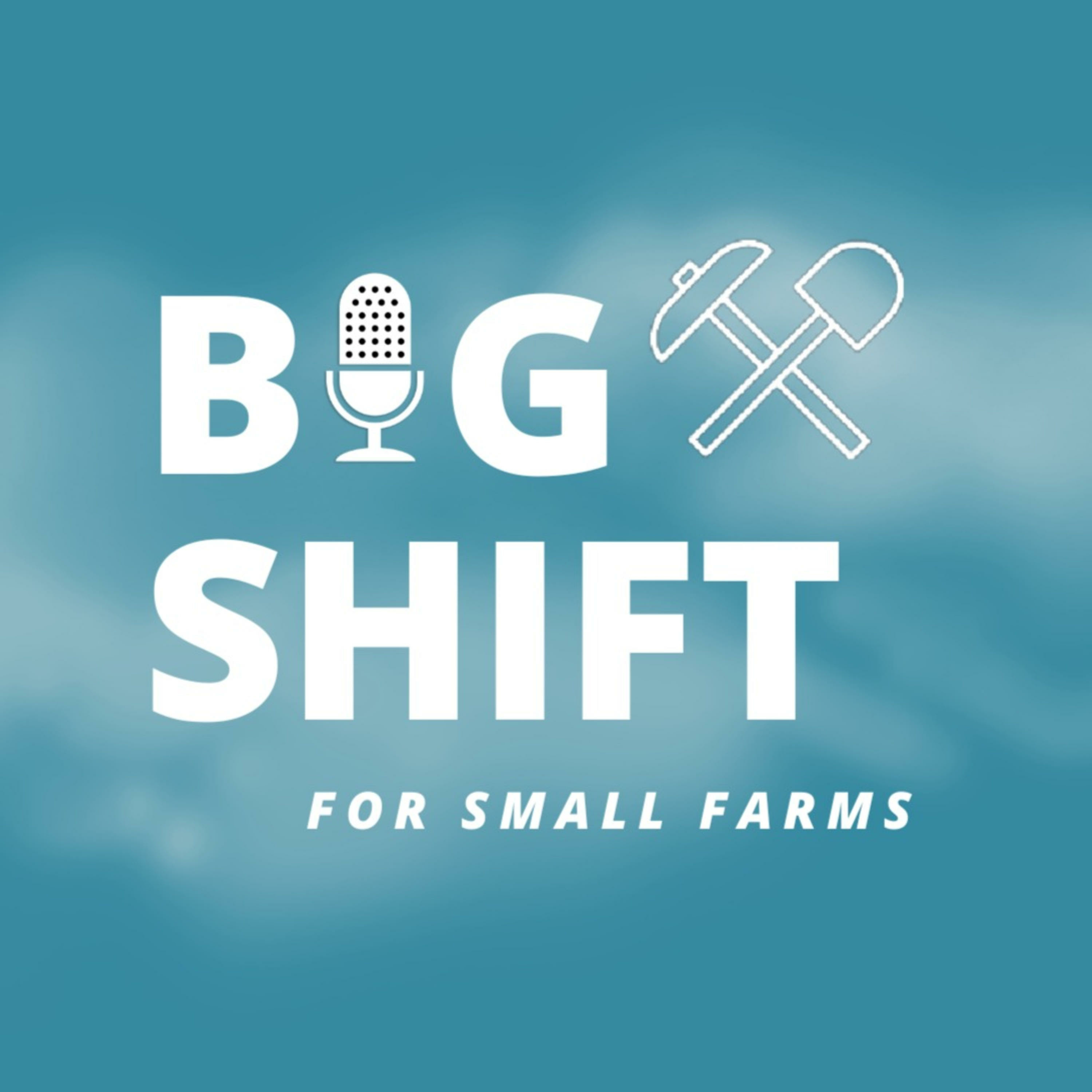

Riparian Zones play an integral role in the Australian landscape - from cultural heritage to agriculture, recreation, and providing habitat for aquatic and terrestrial animals. These areas are crucial for filtering water, preventing erosion, and supporting the overall productivity of the surrounding landscape. They also provide grazing, shelter, and access to water for livestock. Development and agriculture can pose a potential threat to riparian zones. Clearing, overuse, and uncontrolled stock access are some activities that can lead to erosion, habitat loss, and reduced water quality. But there are ways to look after this unique landscape. In this episode, we join three individuals who give us tips on restoring riparian land on your property. As we journey along the creek, we may glimpse one of Australia’s most shy and unique creatures. Thank you to our guests featured in this episode: __ ALEXIA MARTINEZ - farmer MICHELLE RYAN - Senior Lecturer in ecology and environmental Science at Western Sydney University LORI GOULD - Program Manager of the Australian River Restoration Centre __ For more information or to get involved: PlatypusSPOT app https://platypusspot.org/ Australian Platypus Conservancy https://platypus.asn.au/report-a-sighting/ Australian River Restoration Centre https://arrc.au/ Cattai Hills Environment Network (CHEN) https://chen.org.au/ Hosted by Edgars Greste Produced by Grow Love Project and hosted by NSW Local Land Services


Many landholders have been promoting biodiversity and wildlife conservation on their property for many years. Not only is this beneficial for the environment, but through conservation agreements, landholders benefit financially from protecting their patches. Landholders can be involved in a variety of different programs and conservation agreements. One of the main aspects is landholders need to have native vegetation in good condition on their land. In terms of size, smaller farms can collaborate to create larger parcels that may be eligible for financial compensation. In this episode, we’ll hear from private landowners who have been managing biodiversity and promoting wildlife conservation on their land for years - and they have benefited from it in many ways. Thank you to our guests featured in this episode: __ Bev Debrincat - Chair of Greater Sydney Landcare, landholder Xuela Sledge - Koala Project Officer with Greater Sydney Landcare Matt Carr - acting director of the Biodiversity Conservation Trust Jocelyn Howden - founder of the Glenorie Wildlife Refuge __ For more information or to get involved: Landholder guide to conservation agreements https://www.bct.nsw.gov.au/sites/default/files/2020-09/BCT%20Landholder%20guide%20on%20taxation%20issues%20-%20Sep%202020.pdf Biodiversity Conservation Trust https://www.bct.nsw.gov.au/ Land for Wildlife https://cen.org.au/projects/land-for-wildlife Hosted by Edgars Greste Produced by Grow Love Project and hosted by NSW Local Land Services


Citizen Science has been around for a long time. It has allowed vast amounts of data to be collected and analysed within a relatively short period by getting members of the public to participate in scientific research. This research is invaluable as it helps to inform natural resource management, increase environmental protection and inform policy and decision making. It also benefits individuals as they can engage in research and provide public input. There are numerous citizen science opportunities for landholders to get involved in, whether it be about frogs, tree hollows, scats, or even ferals - there is something for everyone. Join us as we speak with three motivated individuals working in this space across diverse topics and landscapes, from water to earth to sky. Thank you to our guests featured in this episode: __ LILLY SCHWARTZ - founder of the Hills Hornsby Rural Koala Project JESSICA LUMBROSO - Land Care Coordinator and Streamwatch Coordinator for the Greater Sydney Land Care BEN HUMPHRIES - Coordinator of the Southern NSW Birds on Farms Project __ For more information or to get involved: Hills Hornsby Rural Koala Project https://www.facebook.com/profile.php?id=100079070600790 Streamwatch https://greatersydneylandcare.org/streamwatch/ Birds on Farms Project https://birdlife.org.au/projects/birds-on-farms/#:~:text=Birds%20on%20Farms%20Southern%20NSW,by%20Chris%20and%20Gina%20Grubb. Australian Citizen Science Association https://citizenscience.org.au/ala-project-finder/ (in partnership with Atlas of Living Australia) Hosted by Edgars Greste and Katie Meyer Produced by Grow Love Project and hosted by NSW Local Land Services


Wildlife corridors are essential for the survival of animals. They also provide additional benefits for both the environment and agricultural productivity. Unfortunately, habitat loss, fragmentation and degradation create immense challenges for animals as they struggle to reach food, water and shelter. But there are many things that landholders can do to improve habitat connectivity and increase wildlife conservation efforts. By planting more trees and creating corridors for animals, landholders contribute to landscape resilience and benefit in many ways by preventing soil erosion, improving crop pollination and providing shelter for stock. Join us in this episode as we journey through three different landscapes and learn about initiatives protecting and restoring our landscapes and natural systems, improving habitat connectivity and benefiting landholders. Thank you to our guests featured in this episode: __ Angie Fricker - Senior Land Services Officer with Greater Sydney LLS Garry Watterson - Landholder Gary Howling - Chief Executive Officer of the Great Eastern Ranges Paul Madden - Project Officer with Community Environment Network __ For more information or to get involved: Hawkesbury-Nepean Landcare Network https://landcare.nsw.gov.au/groups/hawkesbury-landcare-network/creating-koala-corridors-kurrajong/ The Great Eastern Ranges https://ger.org.au/ Community Environment Network (CEN) https://www.cen.org.au/ Hosted by Edgars Greste and Katie Meyer Produced by Grow Love Project and hosted by NSW Local Land Services
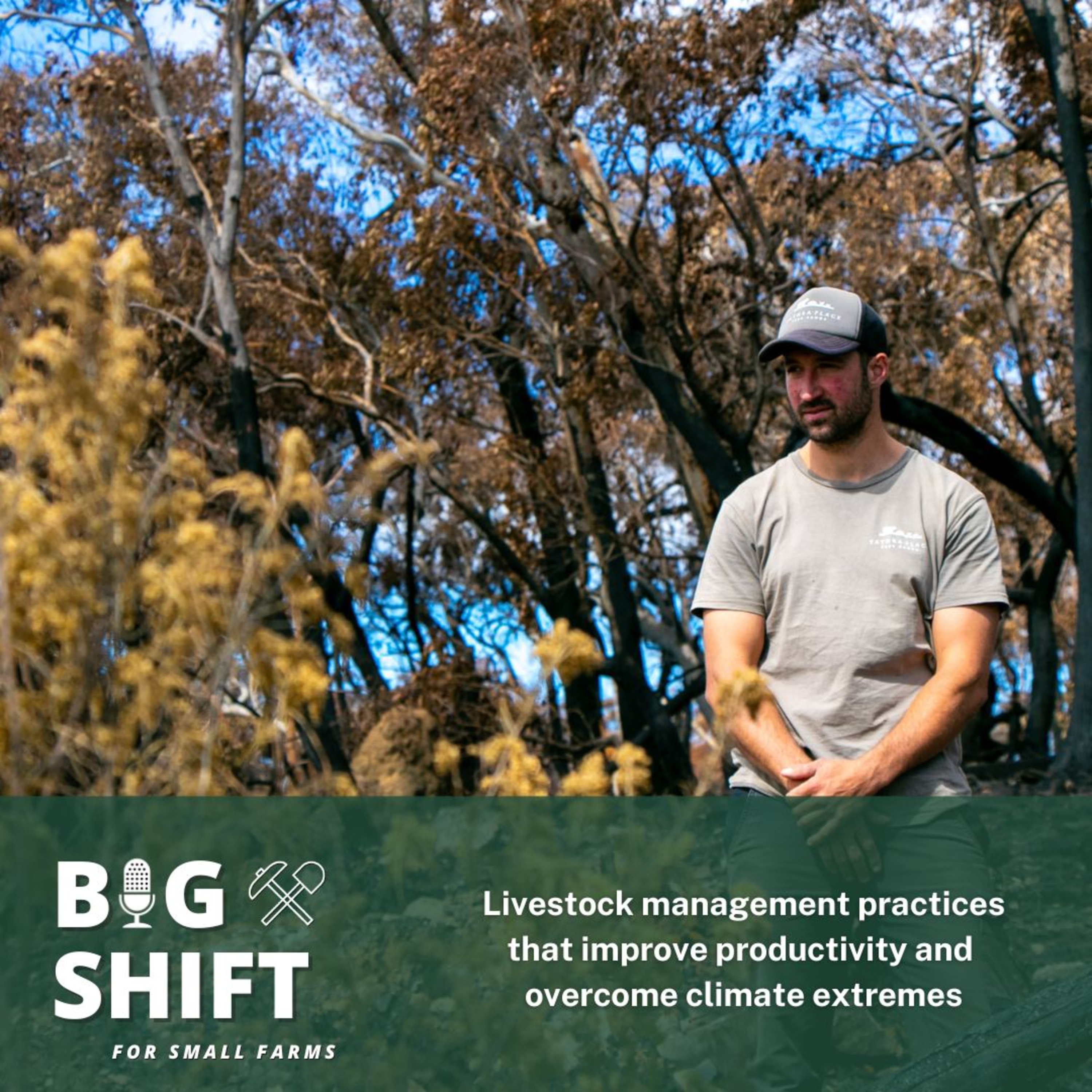

Livestock farming has been practiced for over 10,000 years, so understandably there are many different approaches, particularly when adapting to climate change. Climate change affects livestock production, both directly through heat stress and indirectly through effects on grassland and species distribution. Farmers are innovatively managing their livestock to improve productivity and reduce environmental impacts. The techniques vary, including rotational grazing, precision genetics, species stacking and intensive feeding systems. This episode features three farmers who share how, by implementing these management techniques, they have maintained production during extreme climate events, making their businesses more resilient. Thank you to our guests __ __ https://www.facebook.com/oldcobran/ __ __ __ __ https://www.tathraplacefreerange.com/ Hosted by Edgars Greste and Matt Pierce Produced by Grow Love Project for @NSWDPI and hosted by NSW Local Land Services #Bigshiftforsmallpodcast *NSW DPI understands that successful adaptations will vary between locations, industries and business.
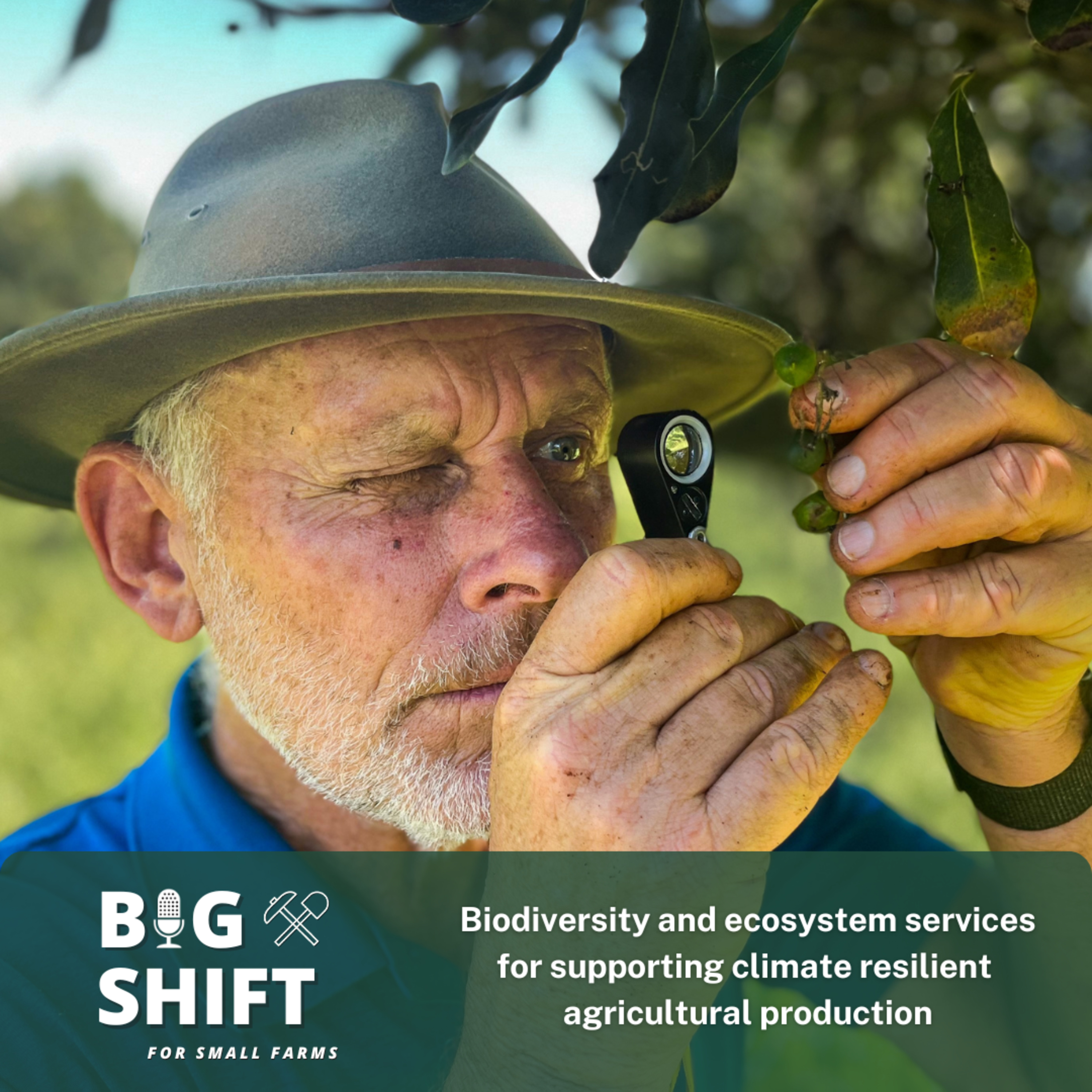

On the road again with Matt and Edgars. This time visiting farmers who have significantly injected life back into their farms growing wine, macadamias and cherries! Biodiversity is essential for ecosystem functions that support all life on Earth. Climate change significantly impacts biodiversity through the increase in the intensity and frequency of fires, storms, or periods of drought. Farmers combat and maintain healthy ecosystems by focusing on regenerative practices such as native plantings, increasing diversity, cover cropping, microbiology and integrated pest management. In this episode, be inspired by farmers who have improved their resilience by increasing whole ecosystem biodiversity on their farms to improve pest control, pollination and carbon sequestration. Thank you to our guests __ __ https://www.dpi.nsw.gov.au/stories/ka-tulloch __ __ https://www.dpi.nsw.gov.au/stories/r-arnett __ __ https://www.dpi.nsw.gov.au/stories/cl-hall Hosted by Edgars Greste and Matt Pierce Produced by Grow Love Project for @NSWDPI and hosted by NSW Local Land Services #Bigshiftforsmallpodcast *NSW DPI understands that successful adaptations will vary between locations, industries and business.


Soil is the foundation which supports all land-based life. Healthy agricultural soils allow functional biology (food webs) and chemistry (nutrient cycling) for efficient and sustainable productivity. Hear from 3 farmers implementing practices to sustain their soils and how they've buffered the impacts from sever climate events. Thank you to our guests • John and Juanita Hamparsum, Drayton Station https://www.dpi.nsw.gov.au/stories/jj-hamparsum • Peter and Darcy Skipworth, Currebah • Justin and Pip Jarrett, See Saw Wines https://www.dpi.nsw.gov.au/stories/jp-jarrett Hosted by Edgars Greste and Matt Pierce Produced by Grow Love Project
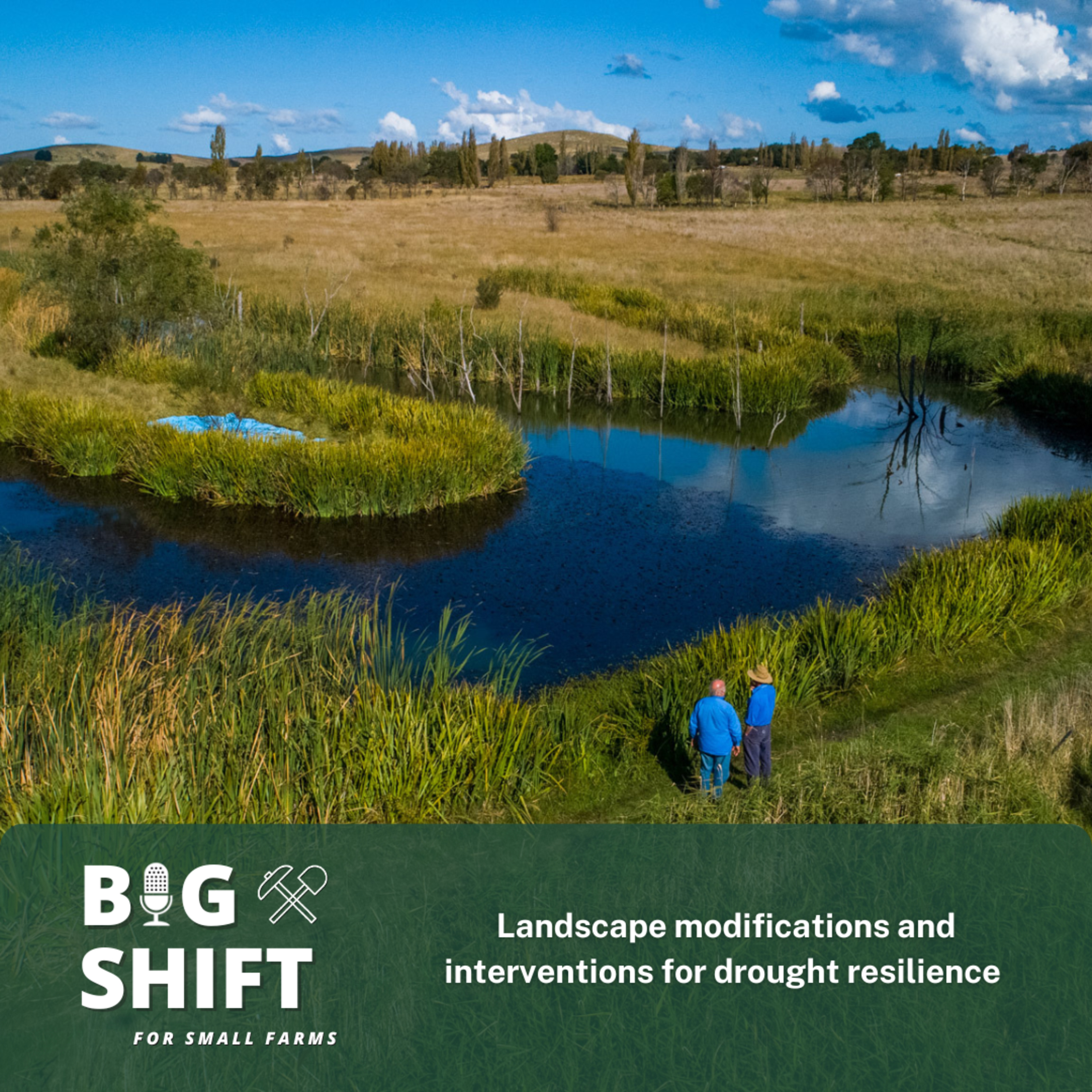

The #ClimateSmart series explores the diverse impacts of #ClimateChange on the landscape and farmers' own experiences in practically adapting their land, systems and businesses. In this episode, we're looking at farmers who have used landscape modification including diversion banks, ponding, swales and leaky weirs to slow and store water flows during rainfall events. Along with restoring ground cover this has significantly reduce erosion and restored landscape function. Thank you to the farmers, you can watch and read their stories here: Scott Preisig and Belinda Scott, Merrylands Station, Kerrigundi, NSW dpi.nsw.gov.au/stories/blake-preisig Glenn Morris, Billabong Farm, Inverell, NSW dpi.nsw.gov.au/stories/g-morris Martin Royds, Jillamatong Farm, Braidwood, NSW dpi.nsw.gov.au/stories/m-royds Watch all the Climate Smart films: dpi.nsw.gov.au/dpi/climate/digital-agriculture/farmer-stories Your hosts Edgars Greste @growloveproject and Matt Pierce @NSWDPI Producers Edgars Greste, Susannah Kable and Katie Meyer Produced by @growloveproject for @NSWDPI and hosted by NSW Local Land Services #Bigshiftforsmallpodcast *NSW DPI understands that successful adaptations will vary between locations, industries and business.
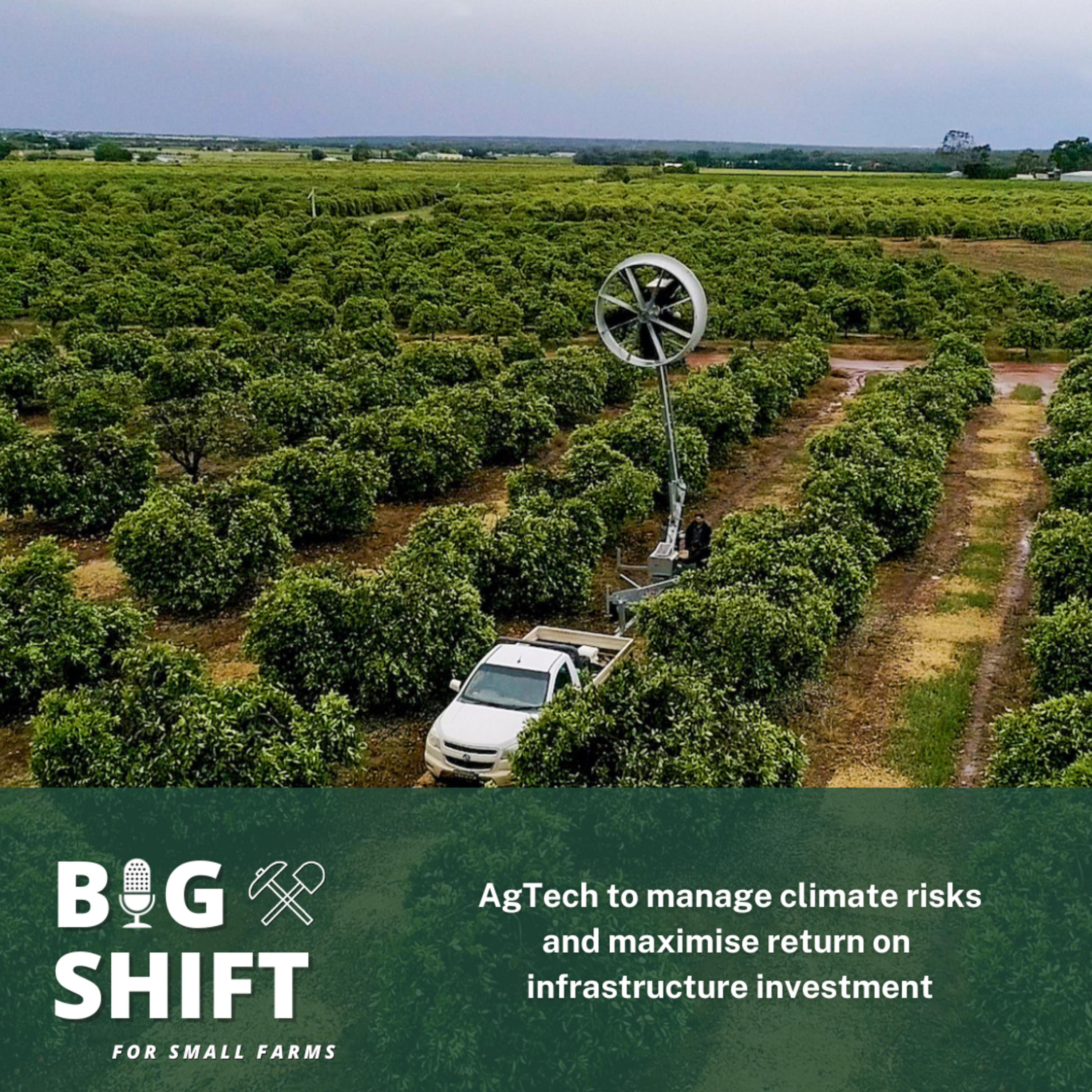

The #ClimateSmart https://www.youtube.com/hashtag/farmerstoriesseries explores the diverse impacts of #ClimateChange https://www.youtube.com/hashtag/climatechange on the landscape and farmers own experiences in practically adapting their land, systems and businesses. In this episode, we're looking at farmers who have adopted digital technology that have allowed them to improve their productivity, improve efficiencies respond to the climate risk, and adapt their enterprises. Thank you to the farmers, you can watch and read their stories here: Vito Mancini blood orange farm, Redbelly Citrus, Griffth NSW https://www.dpi.nsw.gov.au/stories/v-mancini Ewan and Kevin McAsh, Oyster Life Management on the Clyde River near Batemans Bay NSW https://www.dpi.nsw.gov.au/stories/ke-mcash Ian and Pru Pearce, Stoneleigh Orchard near Orange NSW https://www.dpi.nsw.gov.au/stories/ip-pearce Watch all the Climate Smart films: https://www.dpi.nsw.gov.au/dpi/climate/digital-agriculture/farmer-stories Your hosts Edgars Greste @growloveproject and Matt Pierce @NSWDPI Producers Edgars Greste, Susannah Kable and Katie Meyer Produced by @growlovproject for @NSWDPI and hosted by NSW Local Land Services #Bigshiftpodcast *NSW DPI understands that successful adaptations will vary between locations, industries and business.


You know that phrase if you fail to plan, you are planning to fail. Now, depending on which Wikipedia entry you read, either Winston Churchill, Benjamin Franklin or Aristotle or a bunch of other people said it. But the point is, planning is a good thing to do. It helps you identify and reach your goals, realise your vision for your property, and what lifestyle you want to leave. We've actually produced a few episodes on the topic. One on farm planning principles and planning for emergencies, which looks at flood and bushfire preparedness. But in this episode we're taking a look at a farm planning package of tools that Greater Sydney Local Land Services has produced for landowners and managers. It includes a workbook, self-assessment quiz and mapping tool to make this process easier. We'll hear from some new farmers who've trialed the tools to help them get their ideas out of their head and onto some paper or in the computer, and also help them think about stuff that wasn't even on their radar. But first we’re going to get some farm planning fundamentals from coach Kim Deans. Let's get planning. THE WORKBOOK AND SELF ASSESSMENT RESOURCES ARE AVAILABLE TO DOWNLOAD ON THE LLS WEBSITE HTTPS://WWW.LLS.NSW.GOV.AU/REGIONS/GREATER-SYDNEY/KEY-PROJECTS/SMALL-FARMS-NETWORK/PROPERTY-PLANNING-RESOURCES Thank you to all our guests: Richard Stephens and Madeleine Florin from Greater Sydney Local Land Services Kim Deans https://www.reinventingagriculture.com.au/kim-deans Kirrily Smith, Farmer David Adderton, Farmer


Anika Molesworth https://www.anikamolesworth.com/ Nicole Masters https://www.integritysoils.co.nz/ David Carr http://stringybarkecological.com.au/ Adrian Ward https://www.accountingfornature.org/ Rowan Foley https://www.abcfoundation.org.au/ Produced by the Grow Love Project in collaboration with NSW Local Land Services


Most of us know that increasing carbon in the soil has many benefits and with interest in carbon farming growing, our latest episode of The Big Shift Podcast explores how to increase carbon in the soil and the opportunities available for farmers. First up in this episode we explore the science of soil carbon with Dr Susan Orgill followed by a chat with Dr Lorraine Gordon about her journey into carbon farming and how it could be the crop of the future. SUSAN ORGILL, Leader Soils R&D South at NSW Department of Primary https://www.dpi.nsw.gov.au/about-us/research-development/staff/staff-profiles/susan-orgill CAMERON SMITH, Farm Manager KATE CARMICHAEL, Soilkee https://soilkee.com.au/ LORRAINE GORDON https://www.scu.edu.au/regenerativeag/about/team/


For most people, weeds are a dirty word. They’re often talked about as an undesirable plant in the wrong place. And whilst it's true that some species left unmanaged can cause ecological problems, what if weeds are actually trying to tell us something. Something about that place where they’ve shown up that we don’t know about yet. So in this episode we hear from weed whisperers and what they’re saying is don’t blame the messenger because the messenger might actually be part of the solution. THANK YOU TO ALL THOSE WHO SHARED THEIR KNOWLEDGE WITH ALL OF US: NICOLE MASTERS https://www.integritysoils.co.nz/ HAMISH MACKAY https://biodynamics2024.com.au/workshops/ JAMES BARNET RCS https://www.rcsaustralia.com.au/ CLARE EDWARDS https://www.lls.nsw.gov.au/regions/central-tablelands THE GREATER SYDNEY REGIONAL WEED MANAGEMENT PLAN https://greatersydney.lls.nsw.gov.au/__data/assets/pdf_file/0010/722368/Greater-Sydney-Regional-Weed-Mgmt-Plan-FINAL-Sept-2019.pdf PLANT NET https://plantnet.rbgsyd.nsw.gov.au/ PLEASE LISTEN, RATE AND SHARE THIS EPISODE. THANK YOU! Credits This podcast has been produced by the Grow Love Project with support from Greater Sydney Local Land Services, through funding from the Australian Government's National Landcare Program. We acknowledge the First People of this land and recognise their connection to land, water and community. We pay our respects to elders past, present and emerging.


We have dramatically changed the landscape by digging dams, introducing feral animals and clearing native habitat. These actions have created the perfect environment for certain species to thrive including mice, foxes and rabbits, which come with a range of challenges for farmers. So in this episode we’re going to hear about some of the ways we can control these pests and move closer to nature. Please listen, rate and share the episode. With thanks to the following people for sharing their knowledge in this episode: BRIAN WEHLBURG https://www.insideoutsidemgt.com.au DAVID BROOK https://wildbnb.com.au LEE PARKER https://www.lls.nsw.gov.au/regions/south-east/key-projects/every-bit-counts/resources/pest-animals EMMA SAWYERS https://www.dpi.nsw.gov.au/biosecurity PETER WEST https://www.feralscan.org.au Credits This podcast has been produced by the Grow Love Project with support from Greater Sydney Local Land Services, through funding from the Australian Government's National Landcare Program. We acknowledge the traditional custodians of this land throughout Australia and recognise their continuing connection to land, waters and community. We pay our respects to elders past, present and emerging.


Small scale farmers are faced with a lot of pressures, from climate change on farm to competition in the marketplace. In this episode we’re hearing from farmers and producers about Australian made emerging opportunities, from climate tolerant native bush foods to economically sustainable bespoke dairy products. Not only can they help farm business but also the broader community and our planet. Guests featured in this episode include: Cressida Cains, Dairy Cocoon https://www.pecoradairy.com.au/ Chris Andrew, Black Duck Foods https://blackduckfoods.org/ Josh Gilbert, Indigenous agriculturalist http://www.gilbertjoshuam.com/ Tim Wimbourne, Braidwood Food Company https://www.braidwoodfood.com/ Credits This podcast has been produced by the Grow Love Project https://www.growloveproject.com/ with support from Greater Sydney Local Land Services https://greatersydney.lls.nsw.gov.au/, through funding from the Australian Government's National Landcare Program http://www.nrm.gov.au/. We acknowledge the traditional custodians of this land throughout Australia and recognise their continuing connection to land, waters and community. We pay our respects to elders past, present and emerging.


Many of our listeners in NSW have been heavily impacted by recent flooding at the end of March this year. In the Hawkesbury-Nepean river region of Western Sydney, it caught many by surprise peaking at a staggering 12.9 metres, with water engulfing properties and homes. So in this episode we’re bringing you a special recording at a field day on flood recovery hosted by Greater Sydney Local Land Services at their demonstration farm in April. Our producer Olivia Ralph was there to capture some insights from the event. Thanks to Alana, Amy and Tom for sharing their stories. Others featured in this episode: Adam Little, Senior agronomist and livestock specialist - Ace Ohlsson Elders Neil Griffiths, Agronomist and pasture specialist - Hunter Local Land Services Richard Stephens, Regional Agriculture Landcare Facilitator - Greater Sydney Local Land Services Stock that has been in floodwater should be monitored closely to ensure they are eating and watched for signs of disease. Download a copy of our guide to assist landholders to care for livestock in flood https://bit.ly/39dHVc2 https://bit.ly/39dHVc2?fbclid=IwAR0uOg6IviVgzARoApyWrP80oocTf-16eu1S1UizGwKAwYgZju9DEshPUZQ Please contact your local LLS veterinarian on 1300 795 299 for further advice, or if you notice any signs of disease or illness. Credits This podcast has been produced by the Grow Love Project https://www.growloveproject.com/ with support from Greater Sydney Local Land Services https://greatersydney.lls.nsw.gov.au/, through funding from the Australian Government's National Landcare Program http://www.nrm.gov.au/. We acknowledge the traditional custodians of this land throughout Australia and recognise their continuing connection to land, waters and community. We pay our respects to elders past, present and emerging.


In this episode we’re talking about emergency management. We’ll hear from field officers and researchers about the importance of making plans and keeping yourself in check. We will then chat to a farmer who’s using animals as a tool to reduce his fire risk. So let’s get planning. Thank you to all our guests who featured in this episode: Kirsty and Andrew Hambrook, Terrewah Farm - terrewahfarm.com.au //www.terrewahfarm.com.au Linda Hanlon, Senior Land Services Officer, Local Land Services Pet Passport - ses.nsw.gov.au/media/3665/greater-sydney-local-land-services_20pp-a5-booklet_kids-passport_generic.pdf //www.ses.nsw.gov.au/media/3665/greater-sydney-local-land-services_20pp-a5-booklet_kids-passport_generic.pdf Mel Taylor, Associate Professor, Macquarie University Blue Arc - Blue Mountains Animal Ready Community - facebook.com/groups/1045349658940538 //www.facebook.com/groups/1045349658940538 Aaron Brocken, Harvest Farms - facebook.com/HarvestFarmsBilpin //www.facebook.com/HarvestFarmsBilpin


Now according to The Economist Newspaper, the world’s most valuable resource is no longer oil, but data. And what makes it valuable is what we do with it. In this episode we’ll get some tips from farming consultants about how to use data to improve your management both in the paddock and on your balance sheet. And we’ll find out why owning a bird book is a sign that business is going well. Guests featured in this episode include: Mark Gardner, Business consultant - Vanguard Business Services - vbs.net.au //www.vbs.net.au Sarah Nolet, CEO - farmers2founders.com //www.farmers2founders.com Graham Hand, Farm consultant and educator - handfortheland.com //www.handfortheland.com Greg Sharp, Managing Partner - Barrington Accounting - barringtonata.com.au //www.barringtonata.com.au Episode produced by growloveproject.com //www.growloveproject.com


More and more consumers want to buy why you farm as much as what you produce. In this episode we’re looking at the power of your story. We’ll talk to farmers about their journey from small business to becoming a brand and we’ll hear about a platform that’s been built to help farmers not only sell their products but promote their farming practices. Guests featured in this episode include: Lisa Papallo, Marketing expert and founder of fairfoodie.com.au //www.fairfoodie.com.au Angus Maurice, Farmer - farmerbrownspasturedeggs.com.au //www.farmerbrownspasturedeggs.com.au Erica and Hayden Watson - Farmers, Epicurian Harvest https://www.instagram.com/epicureanharvest/?hl=en Luke Winder, Farmer - tathraplacefreerange.com www.https://www.tathraplacefreerange.com/ Episode produced by growloveproject.com //www.growloveproject.com


In Australia we grow a lot of introduced livestock species like cows, pigs, sheep and chooks. So in this episode we’re looking at how to care for your livestock mindfully. We’ll hear from a grazing management consultant about why looking after your landscape could save you big bucks and improve not only your livestock’s health but your own wellbeing too. In this episode we hear from: Anika Molesworth - Agroecology scientist and farmer - anikamolesworth.com //www.anikamolesworth.com Charlie Arnott - Farmer - charliearnott.com.au //www.charliearnott.com.au James Barnet - Grazing management consultant - rcsaustralia.com.au //www.rcsaustralia.com.au Joe Kovacek - Farm manager - westernsydney.edu.au/environmental_sustainability/home/hawkesbury_farm //www.westernsydney.edu.au/environmental_sustainability/home/hawkesbury_farm Cressida Cains - Farmer - pecoradairy.com.au //www.pecoradairy.com.au Episode produced by Grow Love Project //www.growloveproject


www.https://www.vbs.net.au //www.tathraplacefreerange.com Kirsty and Andrew Hambrook - Terrewah Farm (terrewahfarm.com.au https://www.%20terrewahfarm.com.au/) //www.canoelandsorchard.com https://www.%20growloveproject.com/ https://www.lls.nsw.gov.au/regions/greater-sydney


//www.rcsaustralia.com.au //www.stringybarkecological.com.au //www.terrewahfarm.com.au //www.blackduckfoods.org //www.gilbertjoshuam.com //www.growloveproject.com https://www.lls.nsw.gov.au/regions/greater-sydney


Why do you farm the way you do? In this episode we’ll hear from farmers who, through personal illness and tragedy have been forced to reimagine their farming values and practices. And we’ll hear who’s leading the way in holistic land management all to help you make the big shift. In this episode we hear from Brian Wehlburg, farmer/educator - https://www.insideoutsidemgt.com.au/ https://www.insideoutsidemgt.com.au/ Virginia Mall, farmer - https://www.gracespringsfarm.net/ https://www.gracespringsfarm.net/ Martin Royds - https://www.jillamatong.com.au/martin-royds.html https://www.jillamatong.com.au/martin-royds.html Colin Seis, farmer - https://www.facebook.com/ColinSeis/ https://www.facebook.com/ColinSeis/ Murray Prior, farmer - https://www.nguurruu.com/ https://www.nguurruu.com/ Other links to things covered in this episode Local Land Services field day events - https://www.lls.nsw.gov.au/news-and-events/events https://www.lls.nsw.gov.au/news-and-events/events Field of Farmers by Joel Salatin, Polyface Farm - http://www.polyfacefarms.com/product/fields-of-farmers/ http://www.polyfacefarms.com/product/fields-of-farmers/ Alan Savory Ted Talk - http://tiny.cc/savorytedtalk http://tiny.cc/savorytedtalk Credits This podcast has been produced by the Grow Love Project https://www.growloveproject.com/ with support from Greater Sydney Local Land Services https://greatersydney.lls.nsw.gov.au/, through funding from the Australian Government's National Landcare Program http://www.nrm.gov.au/. We acknowledge the traditional custodians of this land throughout Australia and recognise their continuing connection to land, waters and community. We pay our respects to elders past, present and emerging.


There’s a growing trend amongst consumers to know how their food is produced. Certification offers some assurity to customers and a point of difference for producers. But is it certification effective? We’ll chat with farmers who are certified and let you in on a secret that can be even more powerful than a certified label. In this episode we hear from Christina Kelman, farmer - https://ritas-farm-produce.myshopify.com/ https://ritas-farm-produce.myshopify.com/ Tobias Bland, farmer - https://www.instagram.com/kurrawongorganics https://www.instagram.com/kurrawongorganics Professor Rachel Ankeny - https://twitter.com/ankeny_rachel https://twitter.com/ankeny_rachel Brian Wehlburg, farmer - https://landtomarket.com.au/ https://landtomarket.com.au/ Phil Taylor, manager - https://thebeachesmarket.com/ https://thebeachesmarket.com/ Greg newell, farmer - https://www.buymeat.com.au/ https://www.buymeat.com.au/ Shannon Kelly, Full Circle Farm - https://fullcirclefarm.com.au/ https://fullcirclefarm.com.au/ Other links to things covered in this episode https://www.aph.gov.au/Parliamentary_Business/Committees/Senate/Economics/Food_Cert_Schemes/~/media/Committees/economics_ctte/Food_Cert_Schemes/c02.pdf Food Values Group - https://arts.adelaide.edu.au/humanities/food-values/ Credits This podcast has been produced by the Grow Love Project https://www.growloveproject.com/ with support from Greater Sydney Local Land Services https://greatersydney.lls.nsw.gov.au/, through funding from the Australian Government's National Landcare Program http://www.nrm.gov.au/. We acknowledge the traditional custodians of this land throughout Australia and recognise their continuing connection to land, waters and community. We pay our respects to elders past, present and emerging.


Farm resilience in a changing climate is all about understanding the function of our natural landscapes. With longer and hotter droughts and more intensified rain events we need to rethink our current farming practices. So today, we’re going on a journey from the classroom to the paddock to help make your farm a resilient one. Thank you to those who gave their time to be part of this episode: David Marsh, farmer - http://www.arlash.com/tag/david-marsh/ http://www.arlash.com/tag/david-marsh/ Walter Jehne, soil microbiologist - https://www.healthysoils.com.au/ https://www.healthysoils.com.au/ Christina Kelman, farmer - https://ritas-farm-produce.myshopify.com/ https://ritas-farm-produce.myshopify.com/ Peter Hazell - The Mulloon Institute - https://themullooninstitute.org/our-team https://themullooninstitute.org/our-team Martin Royds - https://www.jillamatong.com.au/martin-royds.html https://www.jillamatong.com.au/martin-royds.html Matthew - Jillamatong farm manager Credits This podcast has been produced by the Grow Love Project https://www.growloveproject.com/ with support from Greater Sydney Local Land Services https://greatersydney.lls.nsw.gov.au/, through funding from the Australian Government's National Landcare Program http://www.nrm.gov.au/. We acknowledge the traditional custodians of this land throughout Australia and recognise their continuing connection to land, waters and community. We pay our respects to elders past, present and emerging.


For farmers, compost is like black gold because its really valuable for efficient high quality food production, but just like gold it can be pretty expensive and hard to source. In this episode, we’ll talk to those who produce it, those who study it and those who use it to help you get the best out of your compost. In this episode we hear from Lizzie Buscaino - https://www.piccolofarm.com.au/ https://www.piccolofarm.com.au/ Eric Love, Centre For Organic Research and Education - https://core.asn.au/ https://core.asn.au/ Simone Dilkara - www.landtasiacompost.com http://www.landtasiacompost.com/ Olivier Sofo - https://livingearthfarm.com.au https://livingearthfarm.com.au// Manu Prigioni, Farm It Forward - https://www.farmitforward.com.au/ https://www.farmitforward.com.au/ Martin Royds - https://www.jillamatong.com.au/martin-royds.html https://www.jillamatong.com.au/martin-royds.html Other links to things covered in this episode https://www.aora.org.au/sites/default/files/uploaded-content/website-content/aora_capability_statement_web.pdf https://www.aora.org.au/sites/default/files/uploaded-content/website-content/aora_capability_statement_web.pdf https://www.epa.nsw.gov.au/-/media/epa/corporate-site/resources/warrlocal/150211-garbage-bag-audit.pdf https://www.epa.nsw.gov.au/-/media/epa/corporate-site/resources/warrlocal/150211-garbage-bag-audit.pdf Credits This podcast has been produced by the Grow Love Project https://www.growloveproject.com/ with support from Greater Sydney Local Land Services https://greatersydney.lls.nsw.gov.au/, through funding from the Australian Government's National Landcare Program http://www.nrm.gov.au/. We acknowledge the traditional custodians of this land throughout Australia and recognise their continuing connection to land, waters and community. We pay our respects to elders past, present and emerging.


Community supported agriculture originates back to the 1960s and is a relatively new concept in Australia. At a time when more and more consumers are looking to connect to the source of their food, the CSA model could just be the best way for small scale farmers to grow their businesses. In this episode we hear from Alice Warner - https://fiveservesproduce.com.au/ https://fiveservesproduce.com.au/ Shannon Kelly - https://fullcirclefarm.com.au/ https://fullcirclefarm.com.au/ Lizzie Buscaino - https://www.piccolofarm.com.au/ https://www.piccolofarm.com.au/ Joel Orchard, CSA Network Australia and New Zealand - http://www.csanetworkausnz.org/ http://www.csanetworkausnz.org/ Credits This podcast has been produced by the Grow Love Project https://www.growloveproject.com/ with support from Greater Sydney Local Land Services https://greatersydney.lls.nsw.gov.au/, through funding from the Australian Government's National Landcare Program http://www.nrm.gov.au/. We acknowledge the traditional custodians of this land throughout Australia and recognise their continuing connection to land, waters and community. We pay our respects to elders past, present and emerging.


When it comes to getting your livestock processed. getting to an abattoir can be time-consuming for you and stressful for the animals. in light of this, some innovative farmers are disrupting the conventional supply chain and building their own solutions. From cardboard prototypes to shipping containers we’ll hear their stories and how they got the cash to get started to work out if a mobile abattoir is the right solution for you. In this episode we hear from Anita Taylor & Sarah Burrows - www.red8produce.com.au http://www.red8produce.com.au/ Michael Hicks - www.extraordinarypork.com.au http://www.extraordinarypork.com.au/ Chris Celovic, Manager International Engagement, DPI - https://au.linkedin.com/in/chris-celovic-3b2b4953 https://au.linkedin.com/in/chris-celovic-3b2b4953 Other links to things covered in this episode https://www.business.gov.au/Grants-and-Programs/Minimum-Viable-Product-NSW https://www.business.gov.au/Grants-and-Programs/Minimum-Viable-Product-NSW https://www.abc.net.au/news/rural/2020-03-06/livestock-prices-result-in-tough-times-for-meat-processors/12021146 https://www.abc.net.au/news/rural/2020-03-06/livestock-prices-result-in-tough-times-for-meat-processors/12021146 Credits This podcast has been produced by the Grow Love Project https://www.growloveproject.com/ with support from Greater Sydney Local Land Services https://greatersydney.lls.nsw.gov.au/, through funding from the Australian Government's National Landcare Program http://www.nrm.gov.au/. We acknowledge the traditional custodians of this land throughout Australia and recognise their continuing connection to land, waters and community. We pay our respects to elders past, present and emerging.